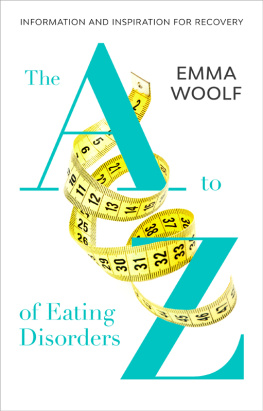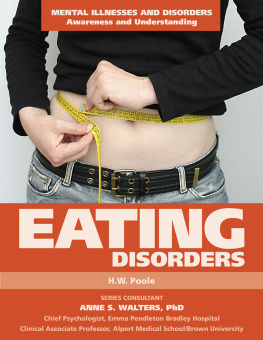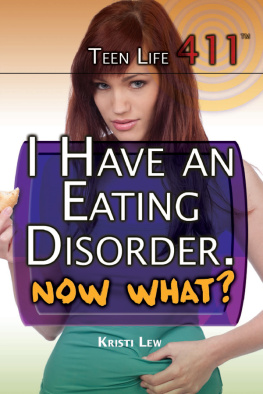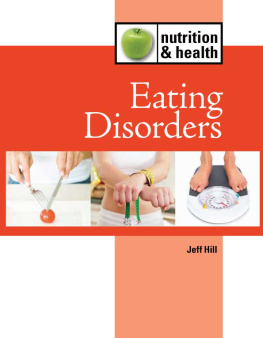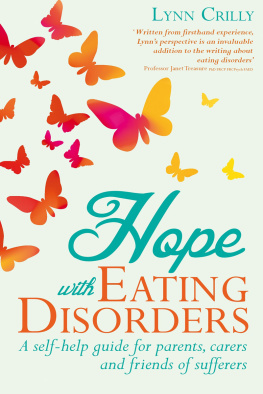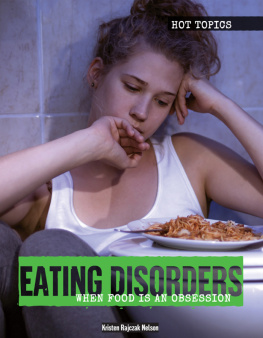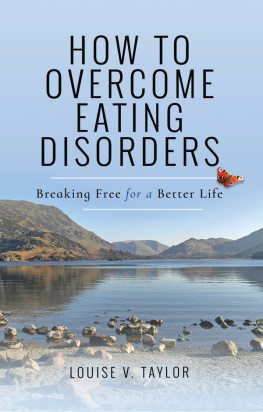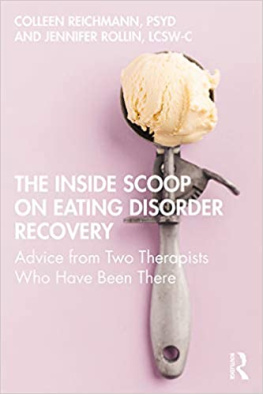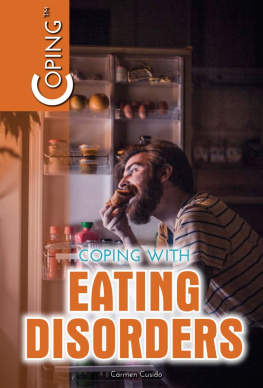
The A to Z of Eating Disorders
Emma Woolf is a writer, broadcaster, former columnist for The Times and Newsweek , and co-presenter on Channel 4s Supersize vs Superskinny . Having studied English at Oxford University, she worked in psychology publishing before going freelance and now writes for a range of newspapers and magazines both in the UK and internationally. She speaks at schools and universities on issues relating to eating disorders and body image, and at literary festivals from Cheltenham to Mumbai. Emma is a regular reviewer on Radio 4s Saturday Review and BBC London, and other media appearances include Newsnight , Womans Hour and the Daily Politics show.
Her first book, An Apple a Day: A memoir of love and recovery from anorexia , was translated into many languages. Her other non-fiction titles include The Ministry of Thin , Letting Go , and Positively Primal , and she has also written several novels.
Emma is the great-niece of Virginia Woolf. You can find her on Twitter @EJWoolf.
Overcoming Common Problems Series
Selected titles
Beating Insomnia: Without really trying
Dr Tim Cantopher
Chronic Fatigue Syndrome: What you need to know about CFS/ME
Dr Megan A. Arroll
Cider Vinegar
Margaret Hills
Coeliac Disease: What you need to know
Alex Gazzola
Coping Successfully with Hiatus Hernia
Dr Tom Smith
Coping with a Mental Health Crisis: Seve n steps to healing
Catherine G. Lucas
Coping with Difficult Families
Dr Jane McGregor and Tim McGregor
Coping with Endometriosis
Jill Eckersley and Dr Zara Aziz
Coping with Memory Problems
Dr Sallie Baxendale
Coping with Schizophrenia
Professor Kevin Gournay and Debbie Robson
Coping with the Psychological Effects of Illness
Dr Fran Smith, Dr Carina Eriksen and Professor Robert Bor
Coping with Thyroid Disease
Mark Greener
Depression and Anxiety the Drug-Free Way
Mark Greener
Depressive Illness: The curse of the strong
Dr Tim Cantopher
Dr Dawns Guide to Brain Health
Dr Dawn Harper
Dr Dawns Guide to Digestive Health
Dr Dawn Harper
Dr Dawns Guide to Healthy Eating for Diabetes
Dr Dawn Harper
Dr Dawns Guide to Healthy Eating for IBS
Dr Dawn Harper
Dr Dawns Guide to Heart Health
Dr Dawn Harper
Dr Dawns Guide to Sexual Health
Dr Dawn Harper
Dr Dawns Guide to Weight and Diabetes
Dr Dawn Harper
Dr Dawns Guide to Womens Health
Dr Dawn Harper
The Fibromyalgia Healing Diet
Christine Craggs-Hinton
Helping Elderly Relatives
Jill Eckersley
How to Stop Worrying
Dr Frank Tallis
Invisible Illness: Coping with misunderstood conditions
Dr Megan A. Arroll and Profess or Christin e P. Dancey
Living with Fibromyalgia
Christine Craggs-Hinton
Living with Hearing Loss
Dr Don McFerran, Lucy Handscomb and Dr Cherilee Rutherford
Living with the Challenges of Dementia: A guide for family and friends
Patrick McCurry
Overcoming Emotional Abuse: Survive and heal
Susan Elliot-Wright
Overcoming Low Self-esteem with Mindfulness
Deborah Ward
Overcoming Worry and Anxiety
Dr Jerry Kennard
Post-Traumatic Stress Disorder: Recovery after accident and disaster
Professor Kevin Gournay
The Stroke Survival Guide
Mark Greener
Ten Steps to Positive Living
Dr Windy Dryden
Treating Arthritis: The drug-free way
Margaret Hills and Christine Horner
Understanding High Blood Pressure
Dr Shahid Aziz and Dr Zara Aziz
Understanding Yourself and Others: Practical ideas from the world of coaching
Bob Thomson
When Someone You Love Has Dementia
Susan Elliot-Wright
The Whole Person Recovery Handbook
Emma Drew
Overcoming Common Problems
The A to Z of Eating Disorders
EMMA WOOLF

To Cecil and Jean Woolf
Note to the reader
This is not a medical book and is not intended to replace advice from your doctor. Consult your pharmacist or doctor if you believe you have any of the symptoms described, and if you think you might need medical help.
Introduction
Since I started writing a weekly column in The Times , and then my first book An Apple a Day: A memoir of love and recovery from anorexia (Summersdale, 2012), Ive been contacted by readers around the world who have similar thoughts and feelings women and men, of all ages and all walks of life, who experience shame about their appetite, guilt with every mouthful, anxiety when eating in public, dislike of their own bodies or just a sense of being out of control around food. An eating disorder can be life-threatening, but everyday disordered eating is also surprisingly common.
Eating disorders are more complex than just diets. The fact remains, however, that the single biggest predictor of developing disordered eating is going on a diet. If the current Western obsession with losing weight with forever slimming down and toning up, with getting the perfect bikini body or the sculpted six-pack is to continue, we need to understand the risks, reasons and potential damage that dieting can do. The A to Z of Eating Disorders is a practical, comprehensive, no-nonsense, myth-busting guide to all the parts of eating disorders that are hard to understand and hard to explain.
The A to Z is written for those who are struggling with any kind of disordered eating or body-image anxiety, and acknowledges both ends of the spectrum. Whatever your attitude, whatever your weight, modern life has made the simple daily act of eating more complicated than ever before. We are tempted to treat ourselves but told to show restraint, we are urged to indulge while being warned of looming obesity epidemics. Given the contradictions between consumption and deprivation and the nonsense terminology around good and bad foods, clean and dirty eating, virtue or sinfulness, its no wonder that many of us avoid food, crave it or overdo it. How can we enjoy something that makes us feel so guilty, greedy or fearful?
The A to Z is also a personal project. Although not referring directly to my own illness, clearly my ten years experience of anorexia and recovery informs everything I write on the subject. I hope my first-hand knowledge will help others to understand how it feels from the inside and reassure those still going through it. I believe that we need to banish many of the inaccurate assumptions about eating disorders. They are not just female problems, they are not just young peoples problems and they are not narcissistic! I am intimately familiar with the shame and secrecy of an eating disorder; they are ugly conditions, they are physically and emotionally self-destructive, and they cause immense pain to others. They are also forms of self-harm. I have not shied away from these more unattractive aspects, because there is a deep need for honesty in this area, as a foundation for recovery.
Science can give us the facts, but it still cannot explain why a starving person will not, cannot, eat. If my experience does anything, I hope it will shine some light on what that feels like from the inside and how to start to break that cycle.
Eating disorders are increasing at an alarming rate. The statistics speak for themselves: a 34 per cent increase in admissions for inpatient care since 2006; an annual increase of 12 per cent in children being treated in hospital for eating disorders; exponential increases among boys and young men, with up to 25 per cent of those affected now thought to be male; girls as young as six years old saying they feel fat or dislike their bodies, and girls under ten starting on the lifelong cycle of dieting.
Next page
